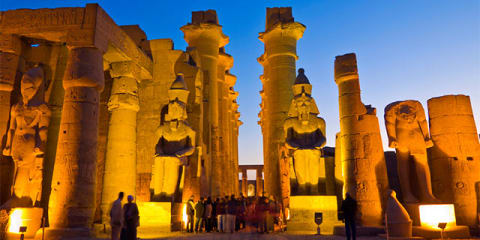 Egypt
Egypt
Egypt is one of the most mysterious destinations in the world. From the Nile River and age-old monuments of the majestic pharaohs to the Great Pyramids dating back to 2500 BC, there's abundant history and culture for travelers to experience. Vibrant, energetic Cairo contrasts starkly with the timelessness of pyramids and the silence of the desert. Marvel at the Pharaoh's treasures, then haggle for your own at a rowdy open-air bazaar. Sail the Nile by a luxury cruise ship or felucca, a small Egyptian sailboat. Join us in celebrating the land of ancient wonders and modern miracles, and see what makes this country a must-visit for all.
Highlights
- Cairo
Set on the Nile River and surrounded by lush vegetation and towering skyscrapers, Egypt's sprawling capital is where East and West come together in a glorious mix of old and new. Cairo, the largest city west of China, is home to the ancient Pyramids of Giza, high-rise hotels, and modern apartment buildings. With a combination of ancient and contemporary, the city will allow you to take a step back in time as you explore the 130,000 treasures of the Egyptian Museum (including the tomb of Tutankhamen) and enjoy the bustling energy of bazaars, cinemas, department stores and more!
- The Pyramids of Giza
Constructed thousands of years ago, the Pyramids of Giza are ancient relics of Egypt's Old Kingdom era. These massive pyramid temples were built for pharaohs that were expected to become gods in the afterlife. The Great Pyramid is the largest of the three massive structures constructed for Pharaoh Khufu. Towering over the desert at around 480 feet, it's estimated that this tomb was created using 2.3 million stone blocks, each block weighing about 2.5 to 15 tons! The construction of these Egyptian pyramids remains a mystery to this day.
- The Great Sphinx
Sitting just south of the Great Pyramid, the Great Sphinx is a 240-foot long, 66-foot high limestone statue that stands as one of the world's most significant monuments. With the face of a man and the body of a lion, it is believed in ancient Egypt that the creature of the Sphinx represents a spiritual guardian; in this case, the Great Sphinx is guarding the pharaoh's entire tomb complex. Although the enormous statue sits on top of the desert sands, the Sphinx was once buried up to its shoulders! The removal of sand began in the early 1800s, and the magnificent monument was finally freed in the late 1930s.
- The Nile River
Flowing through northeastern Africa and connecting to the Mediterranean Sea, the Nile River is the world's longest river, stretching over 4,000 miles. The river flows through and borders ten other countries: Burundi, Tanzania, Rwanda, the Democratic Republic of the Congo, Kenya, Uganda, Sudan, Ethiopia, and South Sudan. Thousands of years ago, the Nile River was a source of irrigation for the surrounding dry area, transforming the desert land into lush greenery. Although the Nile still serves as a source of irrigation today, it is also a means of transportation for trade.
- The Aswan Dam
Composed of stone and clay and standing at 364 feet, the Aswan Dam provides many benefits for Egypt. The main reason for creating this dam was to control the Nile River. The Aswan Dam marks the success of the first time the Egyptians could prevent the annual flooding of the Nile. Before, flooding would ruin surrounding areas and crops, but now with the water controlled, the dam has benefited the area's agricultural industries tremendously. In addition to taming the river, the dam produces electricity, providing many small villages with the luxury of having electricity for the first time. The water collected from the Aswan Dam forms Lake Nasser, a significant water source for the surrounding area.
- Felucca
Feluccas are traditional wooden sailboats invented by the Egyptians, and you are bound to see them passing along the Nile River. In ancient times, feluccas were primarily used for transportation; today, they are still used for transportation and providing relaxing rides and sightseeing for tourists. At the time, these sailboats were the most advanced piece of engineering, mainly relying on the Nile River's breeze and the flowing current to maneuver through the water. Although few feluccas are now made entirely out of wood, the general layout remains very similar to ancient times.
- Valley of the Kings
Lying on the west bank of the Nile River near Luxor, The Valley of the Kings is the most outstanding collection of exquisite tombs dedicated to the pharaohs of the New Kingdom. Also known as the Valley of the Gates of the Kings, this valley was once a royal burial ground for well-known pharaohs such as Tutankhamun, Seti I, and Ramses II. In 1979, the famous valley was declared a UNESCO World Heritage Site. To this day, the meticulously painted tombs of past pharaohs continue to attract foreign and local tourists and travelers.
Fast Facts
Already booked on one of our packages to Egypt? See everything you need to know before you go.
| Overview | Capital: Cairo |
| Entry requirements | Please see our Entry Requirements page. |
| Staying Healthy | There are no health precautions or requirements to enter Egypt. |
| Weather | Egypt generally has a warm and hot weather with cooler nights. The two seasons in Egypt are winter, from November to April and summer, from May to October. Average temperatures during winter range from 60’s to 80’s while in summer, average temperatures range from 80’s to 90’s. During the months of March & April, there will be periods of sandstorms blowing in different places due to the Khamsin. |
| What to wear | Egypt is generally a conservative country and has a very warm climate. Dressing for modesty and comfort is encouraged, especially in big cities like Cairo and the city centers in Luxor and Aswan. Although the dress code at tourist sites tends to be relaxed, we recommend that women avoid revealing clothes such as short shorts and short skirts to avoid attracting unwanted attention or offending the locals. It is best to wear short sleeved t-shirts, capri pants or skirts that cover the knee. We suggest bringing clothes made of cotton, a wide brimmed hat to cover your face and back of your neck. Sunglasses and a light shawl or scarf are also valuable accessories for your trip. If you have two pairs of comfortable (broken in, not brand new) walking shoes, take both pairs. We also suggest bringing a pair of swim shoes, a swimsuit, cover-up, and at least one smart casual outfit for dinners and evening outings. Packing to dress in layers is another way to prepare for a variety of weather conditions. Finally, remember that the countries visited on this tour are casual, and comfort should dictate your wardrobe for the tour. We highly suggest that you bring travel-sized personal toiletries as those available locally may not be the brands you prefer. Be sure to bring insect repellant, high SPF sunscreen, after sun lotion, common drugs and vitamins you normally take as well as extra batteries and chargers for your electronic devices as these may not be readily available in the places visited on this tour. We also suggest bringing close-toed shoes as the streets are dusty and to protect your toes from the hot sand on the sites along the Nile. Small packs of tissues or wipes will also come in handy at rest stops, as toilet paper is not always available. Remember to pack medications in your carry-on bag. |
| Tipping | You will be traveling through Egypt in the company of a professionals who are very committed to making your tour the dream vacation you are counting on. These people feel great pride in being given a chance to show foreign visitors their country. If your guide, driver, and others with whom you are traveling are doing a good job, please take our suggestions for tipping seriously. Naturally, tipping is personal and voluntary, and if you have not received good service, your tip should reflect this fact.
The recommended amounts are as follows:
|
| Money & Credit Cards | The official currency in Egypt is the Egyptian pound. Hotels and some stores accept credit cards (Visa or MasterCard only). However, for “street shopping” you will need local currency or U.S. Dollars. Hotels, banks and foreign exchange bureaus will be able to exchange cash to local currency. We highly recommend that you bring along crisp, new bills. Old, torn, crumpled bills may not be accepted. Be sure to call your credit card providers to let them know you will be traveling abroad, the places you’ll be visiting and the dates of your trip. This is important for your own protection. For small purchases, we recommend that you use the ATM machines to get cash in local currency so that you can avoid using your credit card in unknown shops where there is a higher risk of having your credit card numbers “borrowed” for unauthorized purchases. Traveler’s checks are no longer widely accepted, so there is no need to bring them with you. Always notify your bank prior to departure to avoid any problems using your credit or debit card while traveling. |
| Shopping | You will have ample opportunity during your visit to Egypt to shop for souvenirs, including artwork, handicrafts and even jewelry. If you purchase such items, do so with the understanding that these items may not have the same high value you were led to believe. A good rule of thumb when shopping abroad is to choose items that you love and that will remind you of the destination. If you want to shop for high value items, better do so from a trusted merchant at home unless the pleasure of the happy memory of your trip will keep you from regretting your purchase. While we take great care in arranging the components of your tour, we have no relationship with the shopping venues you’ll encounter, and we cannot be liable for any purchases you make. Your guides will no doubt have some favorite shopping places, where the vendors are known, provide good quality merchandise and probably pay some sort of commission from sales to the guide. This should not surprise or offend you, as this is how business is done throughout the Middle East and other regions around the world. Please keep in mind that many, if not most stores outside the U.S., will not allow exchanges or refunds for your purchased items. Tips for Bargaining: Bargaining is a way of life in the Middle East. If you want to purchase something, whether in a shop or a souk (or bazaar) and you think the price you’ve been quoted is too high, thank the vendor and walk away. Generally, he/she will come after you with a lower price. It is usually considered good bargaining policy to offer half the asking price, and negotiate from there. Negotiations should be done in a respectful way. |
| Electricity & Power Adapters | 220 volts. Plug C. You will need a voltage converter and plug adapter in order to use U.S. appliances. We recommend getting a universal adapter and converter kit. Learn more about electrical standards around the world. |
| Cell Phones & Internet | Want to take your cell phone, tablet or laptop, but not sure how to get cell service or wifi? Read up on using your cell phone abroad and the top 5 ways to get Internet abroad. |
| Photography | Cameras and video recorders are permitted, and photography is generally permitted everywhere except at airports and military installations. Memory cards for digital cameras will be available in major cities. |
| Did you know? |
|
Tours & Packages
- Destinations: Egypt
- including closed packages
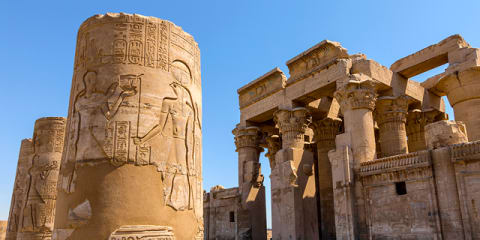
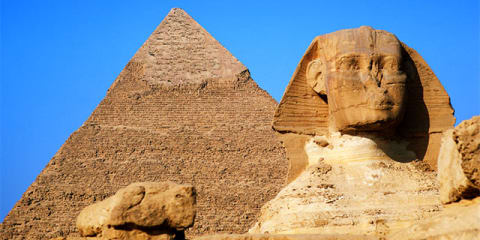
Trip Reviews & Photos
We love hearing your stories and seeing your photos! Check out our entire fan photo gallery and upload your photos.

 Set on the Nile River and surrounded by lush vegetation and towering skyscrapers, Egypt's sprawling capital is where East and West come together in a glorious mix of old and new. Cairo, the largest city west of China, is home to the ancient Pyramids of Giza, high-rise hotels, and modern apartment buildings. With a combination of ancient and contemporary, the city will allow you to take a step back in time as you explore the 130,000 treasures of the Egyptian Museum (including the tomb of Tutankhamen) and enjoy the bustling energy of bazaars, cinemas, department stores and more!
Set on the Nile River and surrounded by lush vegetation and towering skyscrapers, Egypt's sprawling capital is where East and West come together in a glorious mix of old and new. Cairo, the largest city west of China, is home to the ancient Pyramids of Giza, high-rise hotels, and modern apartment buildings. With a combination of ancient and contemporary, the city will allow you to take a step back in time as you explore the 130,000 treasures of the Egyptian Museum (including the tomb of Tutankhamen) and enjoy the bustling energy of bazaars, cinemas, department stores and more! Constructed thousands of years ago, the Pyramids of Giza are ancient relics of Egypt's Old Kingdom era. These massive pyramid temples were built for pharaohs that were expected to become gods in the afterlife. The Great Pyramid is the largest of the three massive structures constructed for Pharaoh Khufu. Towering over the desert at around 480 feet, it's estimated that this tomb was created using 2.3 million stone blocks, each block weighing about 2.5 to 15 tons! The construction of these Egyptian pyramids remains a mystery to this day.
Constructed thousands of years ago, the Pyramids of Giza are ancient relics of Egypt's Old Kingdom era. These massive pyramid temples were built for pharaohs that were expected to become gods in the afterlife. The Great Pyramid is the largest of the three massive structures constructed for Pharaoh Khufu. Towering over the desert at around 480 feet, it's estimated that this tomb was created using 2.3 million stone blocks, each block weighing about 2.5 to 15 tons! The construction of these Egyptian pyramids remains a mystery to this day. Sitting just south of the Great Pyramid, the Great Sphinx is a 240-foot long, 66-foot high limestone statue that stands as one of the world's most significant monuments. With the face of a man and the body of a lion, it is believed in ancient Egypt that the creature of the Sphinx represents a spiritual guardian; in this case, the Great Sphinx is guarding the pharaoh's entire tomb complex. Although the enormous statue sits on top of the desert sands, the Sphinx was once buried up to its shoulders! The removal of sand began in the early 1800s, and the magnificent monument was finally freed in the late 1930s.
Sitting just south of the Great Pyramid, the Great Sphinx is a 240-foot long, 66-foot high limestone statue that stands as one of the world's most significant monuments. With the face of a man and the body of a lion, it is believed in ancient Egypt that the creature of the Sphinx represents a spiritual guardian; in this case, the Great Sphinx is guarding the pharaoh's entire tomb complex. Although the enormous statue sits on top of the desert sands, the Sphinx was once buried up to its shoulders! The removal of sand began in the early 1800s, and the magnificent monument was finally freed in the late 1930s. Flowing through northeastern Africa and connecting to the Mediterranean Sea, the Nile River is the world's longest river, stretching over 4,000 miles. The river flows through and borders ten other countries: Burundi, Tanzania, Rwanda, the Democratic Republic of the Congo, Kenya, Uganda, Sudan, Ethiopia, and South Sudan. Thousands of years ago, the Nile River was a source of irrigation for the surrounding dry area, transforming the desert land into lush greenery. Although the Nile still serves as a source of irrigation today, it is also a means of transportation for trade.
Flowing through northeastern Africa and connecting to the Mediterranean Sea, the Nile River is the world's longest river, stretching over 4,000 miles. The river flows through and borders ten other countries: Burundi, Tanzania, Rwanda, the Democratic Republic of the Congo, Kenya, Uganda, Sudan, Ethiopia, and South Sudan. Thousands of years ago, the Nile River was a source of irrigation for the surrounding dry area, transforming the desert land into lush greenery. Although the Nile still serves as a source of irrigation today, it is also a means of transportation for trade. Composed of stone and clay and standing at 364 feet, the Aswan Dam provides many benefits for Egypt. The main reason for creating this dam was to control the Nile River. The Aswan Dam marks the success of the first time the Egyptians could prevent the annual flooding of the Nile. Before, flooding would ruin surrounding areas and crops, but now with the water controlled, the dam has benefited the area's agricultural industries tremendously. In addition to taming the river, the dam produces electricity, providing many small villages with the luxury of having electricity for the first time. The water collected from the Aswan Dam forms Lake Nasser, a significant water source for the surrounding area.
Composed of stone and clay and standing at 364 feet, the Aswan Dam provides many benefits for Egypt. The main reason for creating this dam was to control the Nile River. The Aswan Dam marks the success of the first time the Egyptians could prevent the annual flooding of the Nile. Before, flooding would ruin surrounding areas and crops, but now with the water controlled, the dam has benefited the area's agricultural industries tremendously. In addition to taming the river, the dam produces electricity, providing many small villages with the luxury of having electricity for the first time. The water collected from the Aswan Dam forms Lake Nasser, a significant water source for the surrounding area.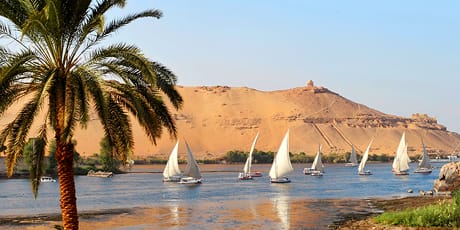 Feluccas are traditional wooden sailboats invented by the Egyptians, and you are bound to see them passing along the Nile River. In ancient times, feluccas were primarily used for transportation; today, they are still used for transportation and providing relaxing rides and sightseeing for tourists. At the time, these sailboats were the most advanced piece of engineering, mainly relying on the Nile River's breeze and the flowing current to maneuver through the water. Although few feluccas are now made entirely out of wood, the general layout remains very similar to ancient times.
Feluccas are traditional wooden sailboats invented by the Egyptians, and you are bound to see them passing along the Nile River. In ancient times, feluccas were primarily used for transportation; today, they are still used for transportation and providing relaxing rides and sightseeing for tourists. At the time, these sailboats were the most advanced piece of engineering, mainly relying on the Nile River's breeze and the flowing current to maneuver through the water. Although few feluccas are now made entirely out of wood, the general layout remains very similar to ancient times.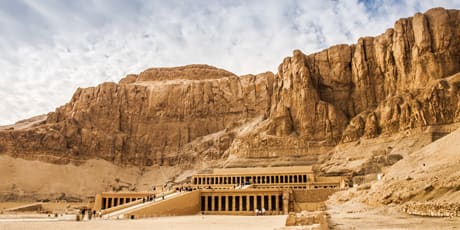 Lying on the west bank of the Nile River near Luxor, The Valley of the Kings is the most outstanding collection of exquisite tombs dedicated to the pharaohs of the New Kingdom. Also known as the Valley of the Gates of the Kings, this valley was once a royal burial ground for well-known pharaohs such as Tutankhamun, Seti I, and Ramses II. In 1979, the famous valley was declared a UNESCO World Heritage Site. To this day, the meticulously painted tombs of past pharaohs continue to attract foreign and local tourists and travelers.
Lying on the west bank of the Nile River near Luxor, The Valley of the Kings is the most outstanding collection of exquisite tombs dedicated to the pharaohs of the New Kingdom. Also known as the Valley of the Gates of the Kings, this valley was once a royal burial ground for well-known pharaohs such as Tutankhamun, Seti I, and Ramses II. In 1979, the famous valley was declared a UNESCO World Heritage Site. To this day, the meticulously painted tombs of past pharaohs continue to attract foreign and local tourists and travelers.